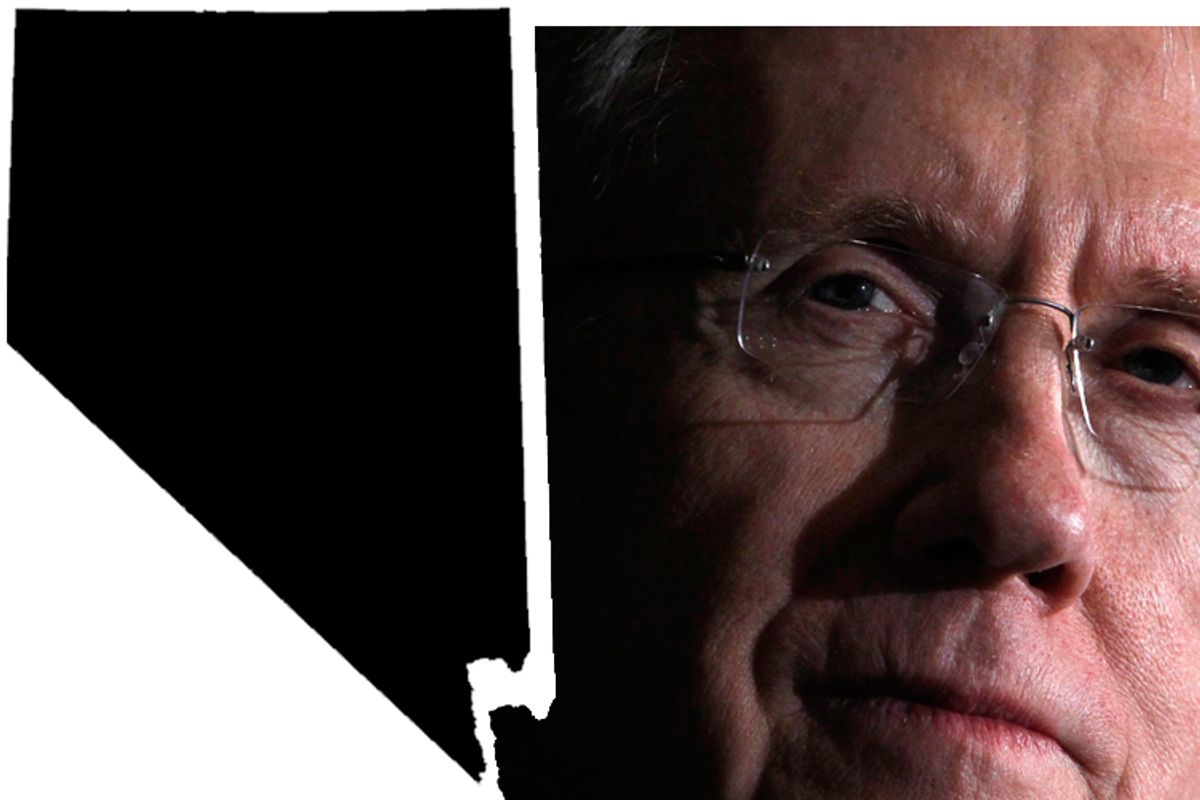On the surface, a Mason-Dixon poll released today is terrific news for Harry Reid. The Senate majority leader needs some big breaks if he's going to secure a fifth term this November, and the survey suggests that one might be on the way, with a Tea Party-backed candidate suddenly surging into contention in the GOP primary.
Sharron Angle, a former assemblywoman from Reno, is now within 5 points of Sue Lowden, the GOP front-runner, according to Mason-Dixon. That's a marked change from a month ago, when Lowden was running away with a three-way race with 45 percent and Angle was a last-place asterisk with just 5 percent.
It's a welcome development for Reid because Angle, with her far-right views, should make for the easiest fall target. Sure, most public polls now show Angle -- just like Lowden and just like the GOP's other candidate, Danny Tarkanian -- leading Reid by a healthy margin. But the assumption is that Angle's current strength is entirely a function of Reid's weaknesses: All things being equal, the Nevada electorate of 2010 is not inclined to send a top Democratic leader back to Washington for six more years.
With Angle's lengthy history of provocative statements and positions, though, Reid could potentially scare independent voters away from her by painting her as too extreme. That's the idea, anyway.
But it might not be that easy. The simplest reason is that this strategy rarely works. It's common for candidates to pin their hopes on the other party nominating a flawed, polarizing candidate. But it's rare for a candidate to win because the other party does so.
When it comes to U.S. Senate races, the most notable recent example probably came 16 years ago, when Democrat Chuck Robb survived a reelection campaign he never should have won simply because the GOP nominated Oliver North. Robb's poll numbers were astronomically negative that year and Virginia's Republican-friendly voters were in revolt against Bill Clinton and the Democratic Congress. Virtually any Republican in Virginia could have ousted Robb -- except North, whose own scandalous background allowed Robb to make the race even more of a referendum on the challenger than on the incumbent.
Before that, you'd probably have to go back to 1984, when Massachusetts Republicans veered sharply to the right, snubbing former U.S. Attorney General Elliot Richardson (whose refusal to carry out Richard Nixon's order to fire Archibald Cox had made him something of a folk hero) in favor of archconservative Ray Shamie. Polls had shown Richardson running ahead of John Kerry, then the state's lieutenant governor, but Shamie was an easy mark for the Democrats. Even as Ronald Reagan carried Massachusetts that fall, Kerry won a 10-point victory over Shamie.
At the gubernatorial level, the best recent example probably came in California in 2002, when Democrat Gray Davis sabotaged moderate Republican Richard Riordan's GOP primary campaign with a last-minute wave of television ads, helping to push conservative Bill Simon over the top. Davis then won an ugly general election fight with Simon, mainly by portraying his foe as a right-wing extremist.
Whether these examples offer much hope for Reid is hard to say. North, for instance, was a nationally known figure about whom all voters had made up their minds long before the election. It was inevitable that the race would be a referendum on him, even with Robb as the incumbent. Angle, whom Nevada's electorate is just getting to know, could plausibly escape this fate, no matter how much mud Reid throws at her. The Shamie and Simon examples offer better models for Reid, but California and Massachusetts are liberal states; voters in both are much more likely to turn on a candidate who's painted as too conservative.
Moreover, there are plenty of cases where a supposedly unelectable candidate has emerged from a primary and then won the general election. This was most famously the case with Ronald Reagan, who was -- believe it or not -- the candidate that Jimmy Carter and his team most wanted to face in 1980. Reagan, they figured, would be easy to portray as a trigger-happy right-wing lunatic. But in the end, voters were just too eager to throw Carter out of office. The bar for Reagan ended up being quite low. He simply needed to portray some warmth and competence, which he did in the race's final televised debate. A 44-state landslide for Reagan ensued.
Of course, to paraphrase Lloyd Bentsen, Sharron Angle is no Ronald Reagan. But for all of her provocative views, she's a poised and confident communicator. And in a race against Reid, the bar for her would be much lower than it was for Reagan. In other words, if Nevadans really want Reid out -- and public polls have consistently suggested they do -- they might not have that much trouble checking off Angle's name.
It’s entirely possible Angle will still lose the GOP primary. Her Mason-Dixon number may prove to be an outlier. And if she is the nominee, Reid may well succeed in convincing Nevadans that she's too extreme for them. In the political climate of 2008 or 2006, this would have been an easy task for him. But in 2010, it's a much iffier proposition.



Shares